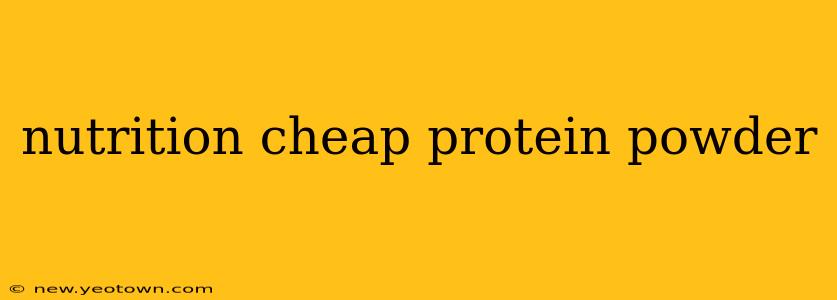Let's be honest, hitting your daily protein goals can feel like a marathon, especially when you're on a tight budget. Protein powder seems like a necessity for fitness enthusiasts, but the price tag can be daunting. This isn't a guide to the absolute cheapest options, regardless of quality. Instead, this is a journey into finding affordable, nutritious protein powders that won't break the bank, while still supporting your health and fitness goals.
What Makes a Protein Powder "Cheap"?
Before diving into specific brands, let's clarify what we mean by "cheap." It's not about sacrificing quality for the lowest price. Instead, we're looking for the best value – the most protein per dollar, while maintaining a decent nutritional profile. This often means considering less-hyped brands, focusing on simple ingredients, and maybe even buying in bulk.
Understanding Protein Sources and Their Costs
The price of protein powder significantly depends on the protein source. Some are inherently more expensive to produce than others. Let's break it down:
-
Whey Protein: Often the most popular, whey is a byproduct of cheese production. While generally affordable, prices fluctuate. Whey concentrates are usually cheaper than isolates or hydrolysates due to their processing.
-
Casein Protein: Another milk-derived protein, casein digests slower than whey, making it ideal for nighttime consumption. It tends to be slightly more expensive than whey concentrate.
-
Soy Protein: A plant-based option that's generally very affordable. Soy protein can be a good choice for those seeking a budget-friendly, complete protein source.
-
Brown Rice Protein: Another plant-based option, but often more expensive than soy. Its mild flavor makes it versatile, although it may not be as complete a protein source as whey or soy.
-
Pea Protein: A growingly popular plant-based option, pea protein tends to be more expensive than soy but is gaining popularity for its clean flavor and digestibility.
Are Cheaper Protein Powders Less Effective?
Not necessarily. Many cheaper protein powders offer excellent nutritional value, albeit perhaps with a slightly less refined processing method. However, always check the ingredient list carefully. Be wary of powders with excessive fillers or artificial sweeteners, which can inflate the price without adding significant nutritional benefits.
How to Find the Best Cheap Protein Powder for You
The best cheap protein powder isn't a one-size-fits-all solution. Consider these factors:
-
Your dietary needs and restrictions: Are you vegan, vegetarian, lactose intolerant, or allergic to specific ingredients? This will significantly narrow your choices.
-
Your fitness goals: Are you looking for muscle growth, weight loss, or general health improvement? Different protein types may better support specific goals.
-
Your taste preferences: Protein powder flavors vary greatly. Experimenting with a few different brands and flavors might be necessary to find what you enjoy.
Where to Find Affordable Protein Powder
Don't limit yourself to big-name brands. Consider these avenues:
-
Bulk purchasing: Buying in larger quantities often reduces the price per serving.
-
Discount stores and online retailers: Check for sales and discounts at various online retailers and health food stores.
-
Smaller, lesser-known brands: These often offer competitive prices without compromising quality.
What to Look For in a Cheap Protein Powder Label
Always carefully review the nutrition label:
-
Protein content per serving: This should be clearly stated and substantial.
-
Ingredient list: Avoid excessive fillers, artificial sweeteners, and additives.
-
Third-party testing: Look for certifications indicating the product has been tested for purity and quality.
Are there any health risks associated with cheap protein powder?
While generally safe, cheap protein powders might sometimes contain lower-quality ingredients or less protein than advertised. Always choose reputable brands that undergo third-party testing. If you have any underlying health conditions, consult your doctor or a registered dietitian before incorporating protein powder into your diet.
How to use protein powder effectively and affordably?
Maximize your protein powder's value by incorporating it strategically into your diet. Use it in smoothies, oatmeal, baked goods, or even as a thickener for soups or stews.
Finding a cheap protein powder that meets your nutritional needs and budget is entirely achievable. By understanding the different protein sources, comparing labels, and strategically shopping, you can power your fitness goals without breaking the bank. Remember, the best protein powder is the one you'll consistently use and enjoy.

